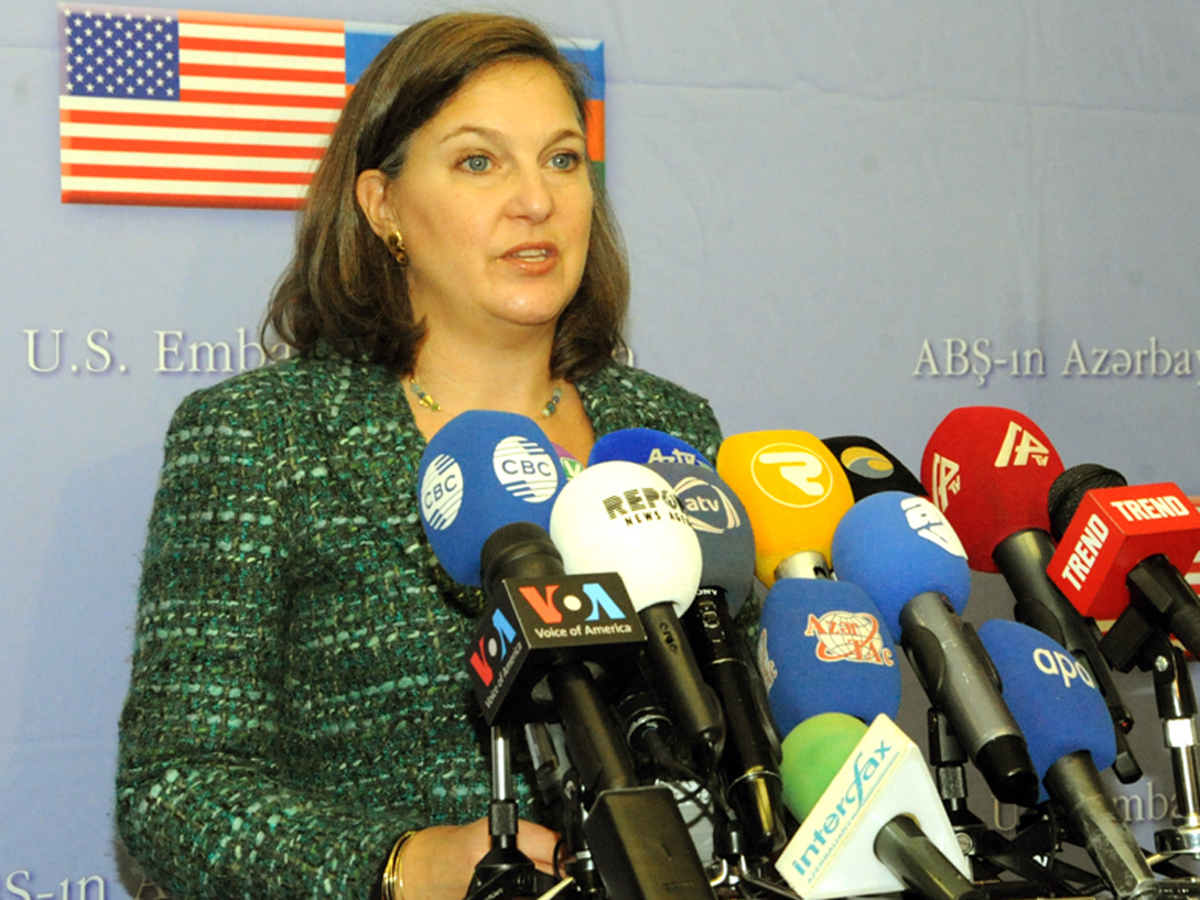Re: Nagorno-Karabagh: Military Balance Between Armenia & Azerbaijan
Azerbaijan Should Be Very Afraid of Victoria Nuland
By Andrew Korybko
March 3, 2015
[Andrew Korybko is the political analyst and journalist for Sputnik
who currently lives and studies in Moscow, English version exclusively
for ORIENTAL REVIEW.]
The US' Assistant Secretary of State for European and Eurasian
Affairs, Victoria Nuland, visited Baku on 16 February as part of her
trip to the Caucasus, which also saw her paying stops in Georgia and
Armenia. While Azerbaijan has had positive relations with the US since
independence, they've lately been complicated by Washington's
`pro-democracy' rhetoric and subversive actions in the country.
Nuland's visit, despite her warm words of friendship, must be look at
with maximum suspicion, since it's not known what larger ulterior
motives she represents on behalf of the US government.
A Bad Omen
Nuland is most infamously known for her `F**k the EU!' comment that
was uncovered during a secretly recorded conversation with the
American Ambassador in Ukraine, Geoffrey Pyatt. The two were
conspiring to build a new Ukrainian government even before
democratically elected (but unpopular and corrupt) president Viktor
Yanukovich was overthrown by the US-supported EuroMaidan coup. Nuland
played a direct role in events, not only behind the scenes, but also
on the streets, since she proudly handed out cookies and other
foodstuffs to the `protesters' that would violently seize power just
over two months later. Her role in the Ukrainian events forever marks
her as an agent for US-supported regime change in the former Soviet
sphere, and her visit anywhere in that space should be seen as the bad
omen that it is.
Like Husband, Like Wife
Normally an individual's personal life doesn't have any bearing on
their professional one, but in the case of Nuland, it's the opposite
because her husband is the leading neo-conservative thinker Robert
Kagan. He and his ilk are known for their expertise in exploiting
foreign geography to maximize US power, regardless of the regional
cost. Also, he previously referred to Azerbaijan in 2006 as a
`dictatorship' and said the US will `pay the price' for dealing with
it when responding to a user-submitted Q&A session with the Financial
Times:
`During the Cold War, both Europeans and Americans had to compromise
with dictators around the world in order to weaken the Soviet Union
and communism. What would be, in your view Mr Kagan, the new sort of
compromises that the US government is willing to make to defeat
terrorism? Corneliu, Bucharest
Robert Kagan: Clearly we are making such kinds of compromises all over
the place in the war on terrorism, although I must say I doubt they
are proving very useful.
We are turning a mostly blind eye to the Mubarak dictatorship in
Egypt, despite much rhetoric to the contrary, as well in Saudi Arabia.
We have been forgiving of the dictatorships in Azerbaijan and
Kazakhstan. Nor have we been very critical of the Putin dictatorship
in Russia, no matter how many people he assassinates.
This is all largely in the service of the war on terror. During the
Cold War I actually believed that we wrong to support so many
dictators, for it often did not help but hurt in the struggle against
communism, in addition to being a violation of the principles we were
struggling to defend.
I am equally unpersuaded today that our support for these
dictatorships will help us fight terrorism, and once again we pay the
price of moral and ideological inconsistency.'
Given the ideological context in which Nuland likely sees eye-to-eye
on with her husband, plus her experience in instigating the Color
Revolution in Ukraine, it is not likely that she came to Baku with
positive intentions, or even with a positive image of the country in
her mind. This is all the more so due to the recent scandal over Radio
Free Europe/Radio Liberty.
Foreign Agent, Domestic Punishment
The US-government-sponsored information agency was closed down at the
end of December under accusations that it was operating as a foreign
agent. While the US has harshly chided the Azeri government for this,
at the end of the day, it remains the country's sovereign decision and
right to handle suspected foreign agents as it sees fit. Azerbaijan's
law is similar to Russia's, in that entities receiving foreign funds
must register as foreign agents, and interestingly enough, both of
these laws parallel the US' own 1938 Foreign Agents Registration Act
(FARA).
So why does the US feel that it reserves the sole right to register
foreign agents and entities, and if need be, identify and punish those
that are acting in the country illegally, but Azerbaijan is deprived
of this exercise of sovereignty? The reason is rather simple, actually
` it's the US that is the most likely to use these foreign agents to
destabilize and potentially overthrow governments (as in Ukraine most
recently), whereas Azeri agents in America, should they even exist,
are nothing more than an administrative nuisance incapable of
inflicting any real harm on the authorities. This double standard is
at the core of the US' relations with all countries in the world, not
just Azerbaijan, but it's a telling example of the power and leverage
Washington attempts to hold over Baku, which is seen most visibly by
the blistering criticism leveled on the government after Radio Free
Europe/Radio Liberty's closing in compliance with the law.
Duplicitous Games
Even more concerning for Azerbaijan isn't the seditious game that the
US and Nuland might be playing within the country, but the
geopolitical one that they might be playing next door with Armenia.
Although Washington says that it values Baku as a strategic and
pragmatic partner, one needs to wonder to what extent a prosperous,
neutral Azerbaijan is more important to the US than a destabilized one
that could be used as a weapon against Russia. To put everything into
context, take a look at the threat that then-Secretary of State
Hillary Clinton issued towards Russia and the Eurasian Union back in
December 2012:
`There is a move to re-Sovietise the region, It's not going to be
called that. It's going to be called a customs union, it will be
called Eurasian Union and all of that, but let's make no mistake about
it. We know what the goal is and we are trying to figure out effective
ways to slow down or prevent it.'
One year later, Ukraine, which could have been of immense value to the
US and its geostrategy as a neutral, stable state, was in the middle
of the US-supported EuroMaidan Color Revolution, showing that
Washington will go to great and dramatic lengths to sacrifice its
pragmatic interests for the sake of destabilizing Russia. So the
question is, could the US also do the same in the Caucasus in order to
simultaneously destabilize Russia from the southern flank while it's
distracted in dealing with Ukraine?
In Armenia Against Azerbaijan, The US Always Wins
Armenia is arguably the weakest member of the Eurasian Union, and is
thus the most prime for any external destabilization attempt. As the
world has seen, the US will even go as far as instigating a war on
Russia's borders (the Ukrainian Civil War) just to hamper its regional
integration efforts in the west. Could it also try to instigate a new
war in Nagorno-Karabakh, too, in order to facilitate this goal in the
south? Azerbaijan doesn't know what matters Nuland discussed with
Armenia behind closed doors, nor what convincing promises or
irresistible threats she may have given Yerevan. The authorities can
no longer be assured that Azerbaijan's enormous energy reserves
guarantee it a safe place in the US' regional vision, especially
considering the caustic language the US has used since the closing of
Radio Free Europe/Radio Liberty. If America is successful in
instigating a continuation war between Armenia and Azerbaijan over
Nagorno-Karabakh, neither of the two states would emerge as the
strategic victor, since it's the US that would ultimately triumph
because it would have succeeded in destabilizing Russia at the entire
Caucasus' expense.
Walking A Tightrope
Given the fact that Azerbaijan can no longer trust the US to not
conspire against its internal or external affairs, it is necessary for
the country to tweak its foreign policy in order to best safeguard its
interests. This means that although Baku cannot outright reject
Washington or forget the two-decades-long history of fruitful
cooperation with it (nor should it), it must pragmatically reorient
its policies to adapt to multipolarity. By this, it is meant that
Azerbaijan should look to diversify its partners and foreign policy
dealings, namely, in the direction of Russia and Iran, the two
neighborly countries that would support its leadership against any
US-inspired plot against it. Although there are certainly challenges
existing in bilateral relations with Iran, this doesn't mean that they
can't be overcome in the interests of preserving Azerbaijan's
prosperity and protecting the country's overall population from any
unwanted trans-Atlantic tinkering that could endanger it.
Despite the fact that the US is most definitely interested in seeing
Azeri energy power the EU, it is not yet known whether this objective
of EU energy diversification is more important than the one of Russian
destabilization. Under such circumstances, Azerbaijan must carefully
walk a tightrope between the West (US/EU) on one hand, and the East
(Russia/Iran) on the other, and if it is successful in delicately
balancing between both worlds, then it can pivotally reap the
resultant benefits thereof and propel its global prominence.
Azerbaijan Should Be Very Afraid of Victoria Nuland
By Andrew Korybko
March 3, 2015
[Andrew Korybko is the political analyst and journalist for Sputnik
who currently lives and studies in Moscow, English version exclusively
for ORIENTAL REVIEW.]
The US' Assistant Secretary of State for European and Eurasian
Affairs, Victoria Nuland, visited Baku on 16 February as part of her
trip to the Caucasus, which also saw her paying stops in Georgia and
Armenia. While Azerbaijan has had positive relations with the US since
independence, they've lately been complicated by Washington's
`pro-democracy' rhetoric and subversive actions in the country.
Nuland's visit, despite her warm words of friendship, must be look at
with maximum suspicion, since it's not known what larger ulterior
motives she represents on behalf of the US government.
A Bad Omen
Nuland is most infamously known for her `F**k the EU!' comment that
was uncovered during a secretly recorded conversation with the
American Ambassador in Ukraine, Geoffrey Pyatt. The two were
conspiring to build a new Ukrainian government even before
democratically elected (but unpopular and corrupt) president Viktor
Yanukovich was overthrown by the US-supported EuroMaidan coup. Nuland
played a direct role in events, not only behind the scenes, but also
on the streets, since she proudly handed out cookies and other
foodstuffs to the `protesters' that would violently seize power just
over two months later. Her role in the Ukrainian events forever marks
her as an agent for US-supported regime change in the former Soviet
sphere, and her visit anywhere in that space should be seen as the bad
omen that it is.
Like Husband, Like Wife
Normally an individual's personal life doesn't have any bearing on
their professional one, but in the case of Nuland, it's the opposite
because her husband is the leading neo-conservative thinker Robert
Kagan. He and his ilk are known for their expertise in exploiting
foreign geography to maximize US power, regardless of the regional
cost. Also, he previously referred to Azerbaijan in 2006 as a
`dictatorship' and said the US will `pay the price' for dealing with
it when responding to a user-submitted Q&A session with the Financial
Times:
`During the Cold War, both Europeans and Americans had to compromise
with dictators around the world in order to weaken the Soviet Union
and communism. What would be, in your view Mr Kagan, the new sort of
compromises that the US government is willing to make to defeat
terrorism? Corneliu, Bucharest
Robert Kagan: Clearly we are making such kinds of compromises all over
the place in the war on terrorism, although I must say I doubt they
are proving very useful.
We are turning a mostly blind eye to the Mubarak dictatorship in
Egypt, despite much rhetoric to the contrary, as well in Saudi Arabia.
We have been forgiving of the dictatorships in Azerbaijan and
Kazakhstan. Nor have we been very critical of the Putin dictatorship
in Russia, no matter how many people he assassinates.
This is all largely in the service of the war on terror. During the
Cold War I actually believed that we wrong to support so many
dictators, for it often did not help but hurt in the struggle against
communism, in addition to being a violation of the principles we were
struggling to defend.
I am equally unpersuaded today that our support for these
dictatorships will help us fight terrorism, and once again we pay the
price of moral and ideological inconsistency.'
Given the ideological context in which Nuland likely sees eye-to-eye
on with her husband, plus her experience in instigating the Color
Revolution in Ukraine, it is not likely that she came to Baku with
positive intentions, or even with a positive image of the country in
her mind. This is all the more so due to the recent scandal over Radio
Free Europe/Radio Liberty.
Foreign Agent, Domestic Punishment
The US-government-sponsored information agency was closed down at the
end of December under accusations that it was operating as a foreign
agent. While the US has harshly chided the Azeri government for this,
at the end of the day, it remains the country's sovereign decision and
right to handle suspected foreign agents as it sees fit. Azerbaijan's
law is similar to Russia's, in that entities receiving foreign funds
must register as foreign agents, and interestingly enough, both of
these laws parallel the US' own 1938 Foreign Agents Registration Act
(FARA).
So why does the US feel that it reserves the sole right to register
foreign agents and entities, and if need be, identify and punish those
that are acting in the country illegally, but Azerbaijan is deprived
of this exercise of sovereignty? The reason is rather simple, actually
` it's the US that is the most likely to use these foreign agents to
destabilize and potentially overthrow governments (as in Ukraine most
recently), whereas Azeri agents in America, should they even exist,
are nothing more than an administrative nuisance incapable of
inflicting any real harm on the authorities. This double standard is
at the core of the US' relations with all countries in the world, not
just Azerbaijan, but it's a telling example of the power and leverage
Washington attempts to hold over Baku, which is seen most visibly by
the blistering criticism leveled on the government after Radio Free
Europe/Radio Liberty's closing in compliance with the law.
Duplicitous Games
Even more concerning for Azerbaijan isn't the seditious game that the
US and Nuland might be playing within the country, but the
geopolitical one that they might be playing next door with Armenia.
Although Washington says that it values Baku as a strategic and
pragmatic partner, one needs to wonder to what extent a prosperous,
neutral Azerbaijan is more important to the US than a destabilized one
that could be used as a weapon against Russia. To put everything into
context, take a look at the threat that then-Secretary of State
Hillary Clinton issued towards Russia and the Eurasian Union back in
December 2012:
`There is a move to re-Sovietise the region, It's not going to be
called that. It's going to be called a customs union, it will be
called Eurasian Union and all of that, but let's make no mistake about
it. We know what the goal is and we are trying to figure out effective
ways to slow down or prevent it.'
One year later, Ukraine, which could have been of immense value to the
US and its geostrategy as a neutral, stable state, was in the middle
of the US-supported EuroMaidan Color Revolution, showing that
Washington will go to great and dramatic lengths to sacrifice its
pragmatic interests for the sake of destabilizing Russia. So the
question is, could the US also do the same in the Caucasus in order to
simultaneously destabilize Russia from the southern flank while it's
distracted in dealing with Ukraine?
In Armenia Against Azerbaijan, The US Always Wins
Armenia is arguably the weakest member of the Eurasian Union, and is
thus the most prime for any external destabilization attempt. As the
world has seen, the US will even go as far as instigating a war on
Russia's borders (the Ukrainian Civil War) just to hamper its regional
integration efforts in the west. Could it also try to instigate a new
war in Nagorno-Karabakh, too, in order to facilitate this goal in the
south? Azerbaijan doesn't know what matters Nuland discussed with
Armenia behind closed doors, nor what convincing promises or
irresistible threats she may have given Yerevan. The authorities can
no longer be assured that Azerbaijan's enormous energy reserves
guarantee it a safe place in the US' regional vision, especially
considering the caustic language the US has used since the closing of
Radio Free Europe/Radio Liberty. If America is successful in
instigating a continuation war between Armenia and Azerbaijan over
Nagorno-Karabakh, neither of the two states would emerge as the
strategic victor, since it's the US that would ultimately triumph
because it would have succeeded in destabilizing Russia at the entire
Caucasus' expense.
Walking A Tightrope
Given the fact that Azerbaijan can no longer trust the US to not
conspire against its internal or external affairs, it is necessary for
the country to tweak its foreign policy in order to best safeguard its
interests. This means that although Baku cannot outright reject
Washington or forget the two-decades-long history of fruitful
cooperation with it (nor should it), it must pragmatically reorient
its policies to adapt to multipolarity. By this, it is meant that
Azerbaijan should look to diversify its partners and foreign policy
dealings, namely, in the direction of Russia and Iran, the two
neighborly countries that would support its leadership against any
US-inspired plot against it. Although there are certainly challenges
existing in bilateral relations with Iran, this doesn't mean that they
can't be overcome in the interests of preserving Azerbaijan's
prosperity and protecting the country's overall population from any
unwanted trans-Atlantic tinkering that could endanger it.
Despite the fact that the US is most definitely interested in seeing
Azeri energy power the EU, it is not yet known whether this objective
of EU energy diversification is more important than the one of Russian
destabilization. Under such circumstances, Azerbaijan must carefully
walk a tightrope between the West (US/EU) on one hand, and the East
(Russia/Iran) on the other, and if it is successful in delicately
balancing between both worlds, then it can pivotally reap the
resultant benefits thereof and propel its global prominence.


















Comment